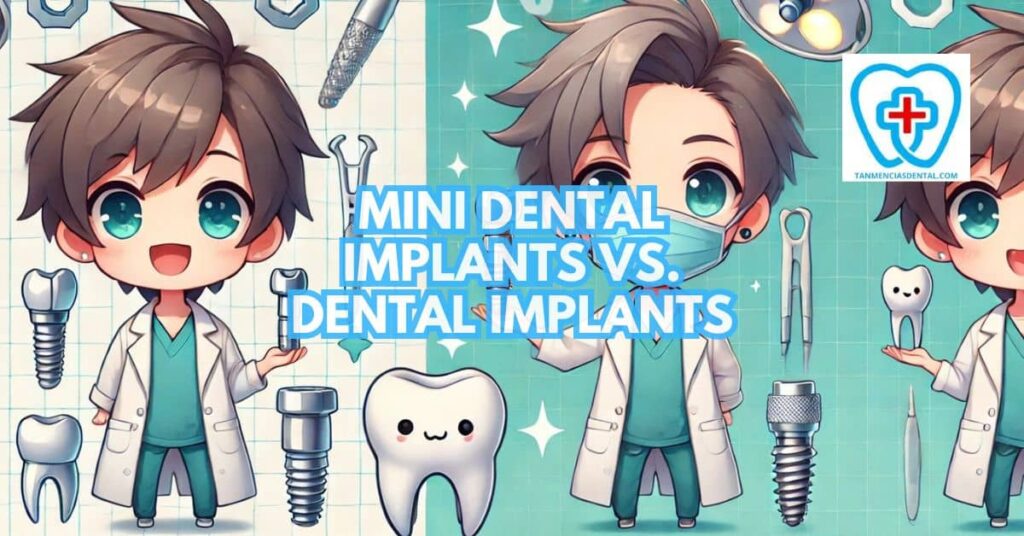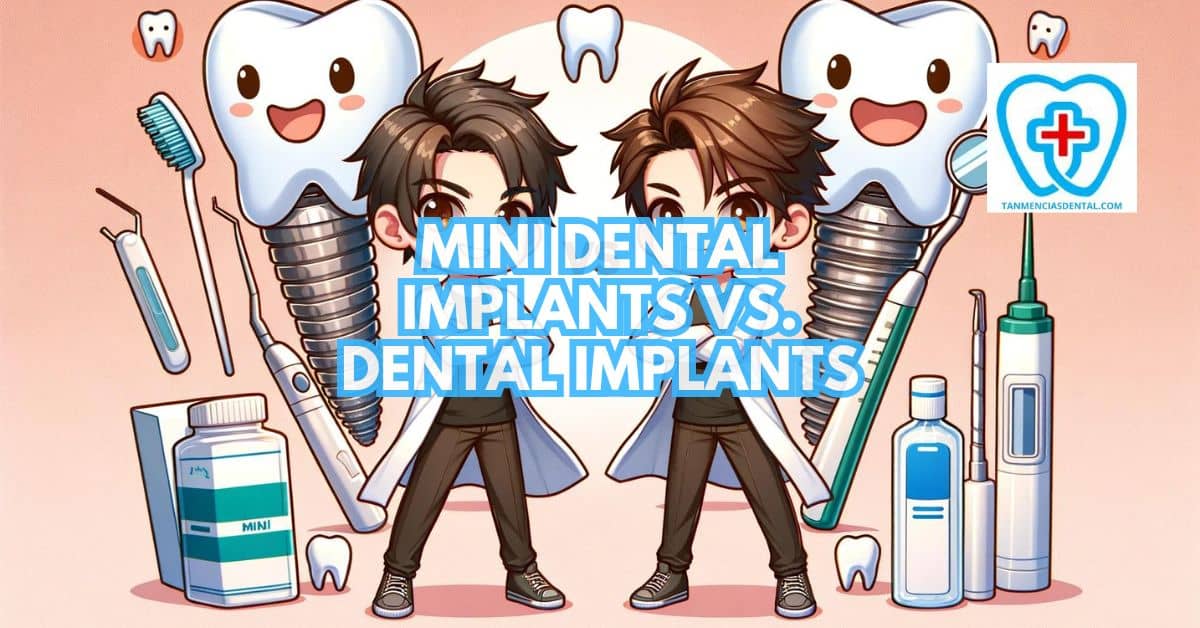Finding the right dental implant option can be challenging when you need to replace a tooth.
Mini dental implants vs. dental implants is a topic that many patients ask about when seeking a better smile.
Mini dental implants are smaller and need less bone, while traditional dental implants offer more stability and strength.
Choosing between the two depends on your overall health, dental needs, and budget.
We’ll explain the differences to help you decide which implant option best fits your smile.
1. Size Matters: A Tale of Two Implants
Mini dental implants are significantly smaller in diameter than standard dental implants, often measuring less than three millimeters across.
This size difference means that mini implants require less bone for placement, making them a good option for patients who have experienced bone loss in their jaw.
Because they are thinner, mini dental implants can often be placed without the need for bone grafting, which can save time and reduce recovery periods.
Standard dental implants, on the other hand, are larger and generally provide greater long-term stability due to their wider structure.
However, if a patient’s jaw lacks sufficient bone density, they may need a bone graft before receiving standard dental implants, adding extra steps to the procedure.
Choosing between these two options depends on factors like bone health, budget, and the need for durability in biting and chewing.
A thorough consultation with a dentist can help determine whether a mini dental implant or a standard dental implant is the best fit for your needs.
🦷 How Teeth Whitening Can Hurt Your Gums and What to Do About It
2. Candidate Considerations: Who Needs Mini vs. Traditional Implants?
Not everyone is a candidate for both types of implants.
Mini dental implants are ideal for patients with less bone density, as their smaller size allows for easier placement in limited spaces.
Traditional implants are suitable for those with sufficient bone structure and those needing extensive dental work.
Your overall health, bone condition, and specific dental needs will determine the best option.
Consulting with a dental professional is essential to evaluating your suitability for each type.
🦷 Can Retainers Help Straighten Your Teeth Without Braces?
3. The Surgical Showdown: Minimally Invasive Mini Implants vs. Traditional Implant Placement
The placement procedure for mini implants is much simpler and less invasive compared to traditional implants.
In modern dentistry, mini implants are often inserted in a single visit, with minimal discomfort and a faster recovery time.
Since they are smaller, the procedure is much quicker and usually does not require bone grafting, making them a good choice for patients with lower bone density.
Traditional implants, however, involve a more complex process that typically includes multiple stages over several months.
This extended timeline is necessary because the implant must fully integrate with the jawbone before the final restoration is placed.
For patients looking to replace missing teeth, mini implants offer a convenient solution, while traditional implants provide a more permanent and durable option.
Understanding the differences between these procedures can help patients make informed decisions based on their specific dental needs.
🦷 Can Quotes About Brushing Actually Make You Excited to Brush?
4. Strength and Stability: Big or Small, Can They Handle Your Bite?
Strength and stability are critical factors in choosing dental implants.
Traditional implants, due to their larger size, generally offer superior stability and can handle higher bite forces.
They are often recommended for molars or areas requiring significant chewing strength.
Mini implants, while stable, may not provide the same level of support for intense biting or extensive restorations.
Your specific needs and the location of the implant will influence the choice between mini and traditional implants.
🦷 Can You Use Whitening Toothpaste With Braces? Here’s What You Should Know

5. The Cost Factor: Weighing the Affordability of Mini vs. Regular Implants
Cost is a significant factor for many patients when deciding between mini dental implants and traditional implants.
Mini dental implants are typically less expensive because they require less titanium, involve a simpler placement procedure, and often do not need bone grafting.
Since mini implants are smaller, they also require fewer surgical visits, reducing overall treatment costs and making them a more affordable option for patients on a budget.
Traditional implants, however, are larger and often include separate components like a titanium post, an abutment, and a custom crown or denture, which can increase the total cost.
Although they are more expensive upfront, traditional implants may provide greater durability and stability, making them a worthwhile investment for patients who need long-term solutions.
For those considering a denture, mini implants can be used to secure it in place at a lower cost compared to traditional implant-supported dentures.
In the end, patients should compare the short-term affordability of mini implants with the long-term benefits of traditional implants before making a decision.
🦷 Can Veneers Get Cavities? What Your Dentist Wishes You Knew
6. Durability Debate: Mini Marvels or Long-Lasting Legends?
When it comes to durability, traditional implants often have the edge.
They are designed to last many years, with some patients enjoying their benefits for decades with proper care.
Mini implants, while durable, may not have the same longevity, especially under high stress.
The choice between the two will depend on your dental health and the demands placed on the implants.
Regular dental checkups and good oral hygiene can help maximize the lifespan of both types.
🦷 Can You Whiten Bonded Teeth at Home? Here’s the Truth
7. Recovery Rumble: Speedy Mini Implants vs. Traditional Implant Healing
Recovery time is an important factor to consider when choosing between dental implants and mini implants.
Since mini implants are smaller and require a less-invasive procedure, patients typically heal faster and experience less swelling or discomfort.
Many people who receive mini implants can resume normal activities within a few days, making them a convenient option for those with busy schedules.
A standard implant, however, involves a more complex process, including surgically placing the implant into the jawbone and waiting for it to integrate, which can take several months.
Because of this extended healing period, traditional implants may require patients to follow a soft food diet and avoid putting pressure on the area for a longer time.
For individuals with significant tooth loss, both options can provide stability, but mini implants allow for a quicker return to eating and speaking comfortably.
By understanding the differences in recovery, patients can make informed decisions that align with their lifestyle and dental health needs.
🦷 Simple Tips for Keeping Your Teeth Healthy
8. Aesthetics Arena: A Winning Smile Regardless of Implant Size?
Both mini and traditional dental implants aim to provide a natural-looking smile.
Mini implants are often used for smaller teeth or in less visible areas, but they can still deliver impressive aesthetic results.
Traditional implants are versatile and can be used for a wide range of dental restorations, ensuring a seamless blend with your natural teeth.
The choice between the two will largely depend on the specific location and visibility of the implant.
Regardless of size, both types strive to enhance your smile’s appearance effectively.
🦷 Do Chipped Teeth Heal on Their Own? Why You Might Need Professional Help
9. Maintenance Matchup: Caring for Mini vs. Traditional Implants
Proper care is essential to maintaining the longevity of both mini and traditional implants.
Daily brushing and flossing, along with regular dental checkups, are necessary to keep implants healthy.
Mini implants might require more frequent monitoring due to their smaller size and the areas in which they are typically placed.
Traditional implants, while generally robust, also need diligent care to prevent complications.
Both types benefit from a consistent oral hygiene routine to ensure their durability and performance.
🦷 What Happens If You Skip Brushing Your Teeth With Braces?
10. Understanding Implant Risks
Dental implants can sometimes lead to infections or other problems.
Mini implants may have a lower chance of infection because of their smaller size.
Traditional implants need more bone support, which can cause issues if the bone is weak.
Both types require careful care after surgery to avoid complications.
Your dentist will help you choose the best option to keep these risks low.
🦷 Can Crowns Get Cavities? What You Need to Know and How to Protect Them
11. The Ultimate Champion: It Depends on Your Smile’s Needs!
There is no definitive winner in the battle between mini and traditional dental implants.
The best choice depends on individual factors such as bone density, budget, and specific dental requirements.
Mini implants are ideal for patients with limited bone structure or those seeking a quicker, less invasive option.
Traditional implants are better suited for extensive restorations and long-term stability.
Consulting with a dental professional is crucial to determining the optimal solution tailored to your unique smile needs.
🦷 Expert Dental Care at Tan-Mencias Clinic in Marikina
👨⚕️ Conclusion
Deciding between mini and traditional dental implants involves careful consideration of various factors.
Both types offer unique advantages and cater to different dental scenarios.
The right choice hinges on your specific dental health, aesthetic goals, and financial considerations.
Ultimately, the best implant is the one that aligns with your individual needs and ensures a healthy, confident smile.
Consulting with your dentist will help you make an informed decision for the best outcome.
😊 Self-Promotion
Visit Tan-Mencias Dental Clinic in Parang, Marikina City, for top-notch dental care with a friendly touch!
Our team is dedicated to making your smile shine bright and your experience pleasant.
Have questions or concerns?
Give us a call at 9171451074, send a message through our Facebook page, or reach out via our website’s contact form.
We’re here to help, and we can’t wait to see your smile!

